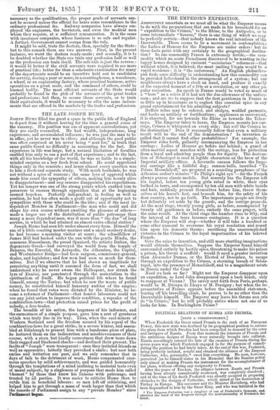THE EMPEROR'S EXPEDITION.
Ansonurzix uncertain as we must all be what the Emperor means to do with the preparations that are made in his household for an " expedition to the Crimea," to the Rhine, to the Antipodes, or to some intermediate " bourne," there is one thing of which we may be perfectly certain—that nobody knows the real intentions of the Inscrutable. There seems to be a movement in contemplation; the Ladies of Honour for the Empress are under orders : but do these facts point with any certainty to the geographical destina- tion ? In one commodity France is extremely fertile,—the com- modity which an acute Frenchman discovered to be wanting in the happy homes designed by eminent " societarian " reformers—that without which, it is believed, the most smiling Utopia would be a vapid residence : it is "the unforeseen." An English philanthro- pist finds some difficulty in understanding how this commodity can
i be provided beforehand in the arrangement of a system; but our neighbours always have a stock on hand, and produce it exactly at the expected moment of a fête or a revolution, or any other po- pular recreation. An epoch in France would be voted as much of a " bore " as a soirée if it had not the die allowance of the unfore- seen ; and are we to suppose that the first gentleman in France is so little up in bienseance as to neglect this essential spice in any grand entertainment for his admiring subjects P
Buffalo robes may be ordered, and sledges, wadded garments, and books on artillery or fortifications; appliances as convenient, it is observed, for use towards the Rhine as towards the Tcher- naya. The Emperor takes to horse, the Empress mounts her car- riage, Crimea is whispered on every aide; but will the Crimea be the destination? Does it necessarily follow that even a military result will be the end of the demonstration ? Is invention so palled that it cannot find other probabilities ? For example, the. Emperor rides forth, gallantly accompanying the Empress in her carriage; Ladies of Honour go before and behind ; a guard of ultra-martial aspect marches with the cortege, less for prcitection from a loyal and admiring people than for dignity. The destruc- tion of Sebastopol is read in legible characters on the brow of the Imperial artillery-officer. A favourite cannon follows the Impe- rial carriage like a faithful dog ; cannon-balls, inscribed "To, Prince Mensohikoff," are prepared as a sounding paraphrase of the Athenian archer's missive "To Philip's right eye'—for the French always pursue classic models. But scarcely has the Emperor left his capital, before ten young girls robed in white, their eyes bathed in tears, and accompanied by ten old men with white beards and hair, suddenly present themselves before him, throw them- selves at his horse's feet, and beseech him, for the safety of his dear country, not to go forth. The importunate people are firmly but delicately set aside by the guards, and the cortege proceeds. At the next stage, twenty young girls, as before, accompanied by twenty old gentlemen as before, embody the same prayer, with the same result. At the third stage the number rises to fifty, and the interest of the tears becomes contagions. It is a question where the Emperor will stop—whether it will take a hundred or some other numeral to overcome his royal resolution and reseat him upon his domestic throne; sacrificing the unaccomplished victories in the Crimea to the loyal importunities of his beloved French.
Give the reins to invention, and still more startling imaginations would obtrude themselves. Suppose the Emperor found himself surrounded entirely by hostile spies, threatening to make his palace a prison, his throne a scaffold : would it need a greater invention than Alexander Dumas, or the Elected of December, to escape through an expedition to the Crimea, a storming breach of Sebas- topol, into the presence of Mensehikoff, and to a magnificent estate in Russia under the Czar ?
Need we look so far ? Might not the Emperor disappear upon, an expedition, as Lord John disappeared upon a back bench, only to reappear at Vienna ? The envoy sent forth from Paris, perhaps, would be M. Drouyn de Lhuys or M. Persigny ; but when the re-,. presentative of France appears before the assembled statesmen, tearing off his travelling-cloak, he proves to be no other than the Inscrutable himself. The Emperor may leave his throne aux cris do "la Crimee," but he will probably arrive where not one of us looks for him. In Buckingham Palace ?


































 Previous page
Previous page